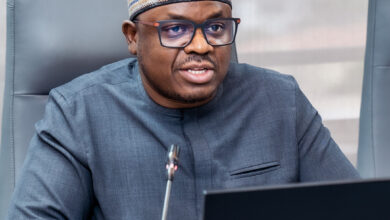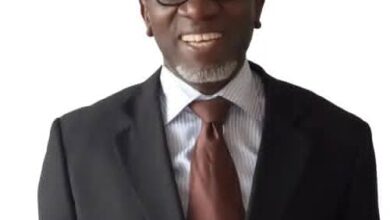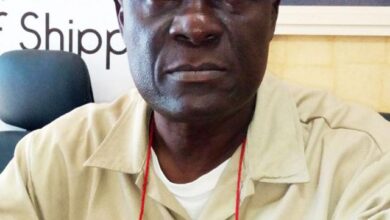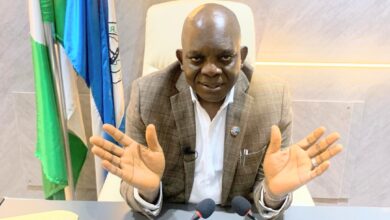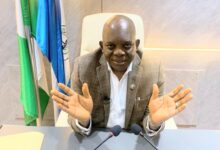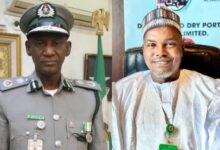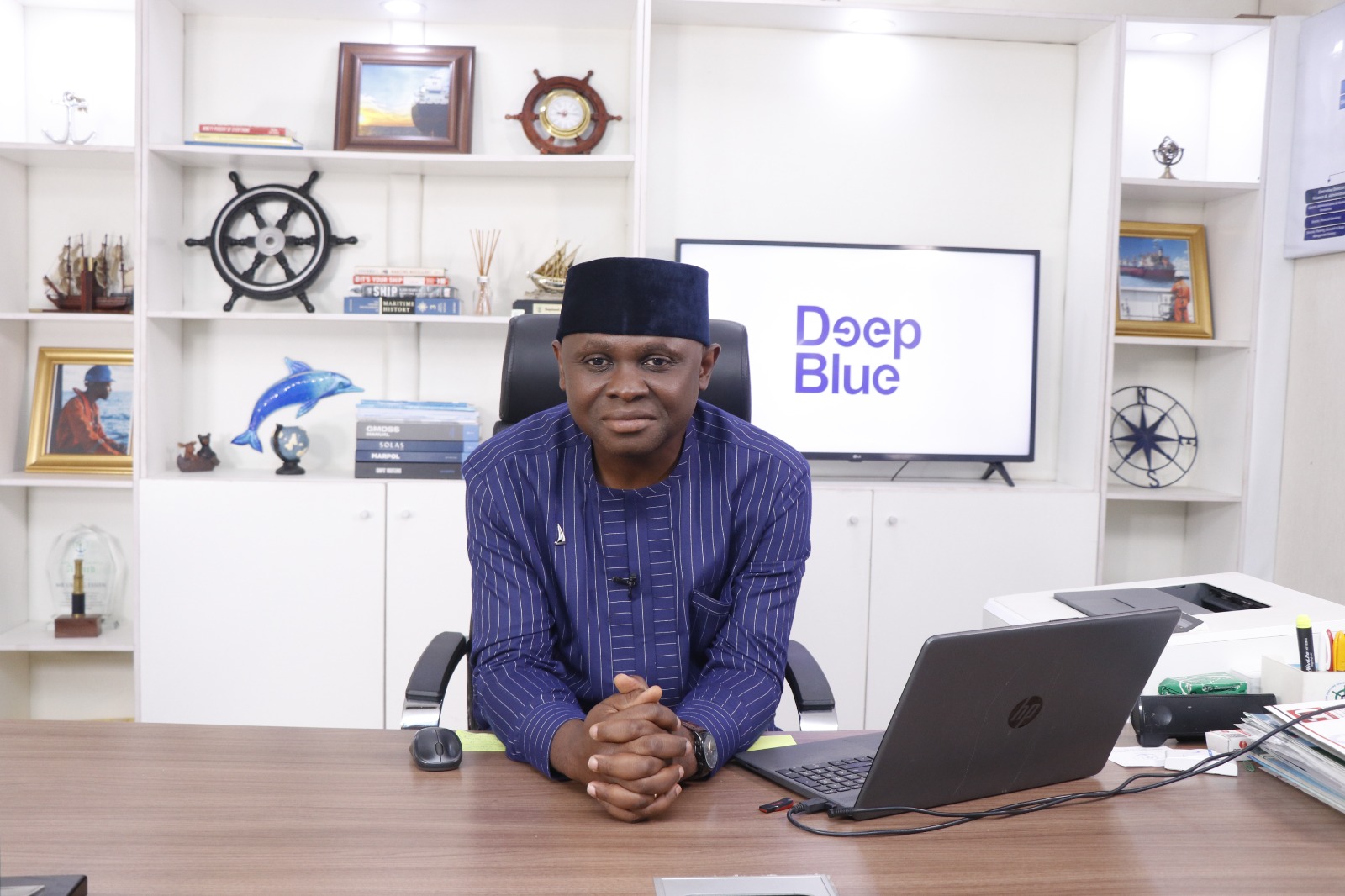
Ubong Essien, West Africa’s first Certified Speaking Professional and Dean of the School of Eloquence, recently served out his time as Special Adviser to the Director General of NIMASA on Communications and Strategy. He spoke to Ismail Aniemu in Lagos about his experience in the maritime sector and managing public perception of the country’s foremost maritime regulatory Agency while relating with stakeholders and the media.
Except
As SA to the DG NIMASA on comms and strategy, what was the experience like for you?
I summed up my three years of experience in NIMASA as an apprenticeship. I use the word ‘apprenticeship’ deliberately because when you enter a new environment, you appreciate the level of work before you and know that you will essentially learn new things and add value.
No matter what expertise you bring from your prior field into a new one, as long as you are expected to perform, work, and deliver results, you have to do some significant amount of on-the-job learning about that industry or sector.
In that sense, I look at it as an apprenticeship in maritime, as well as in governance and the public sector. I have never had to work full time, as it were, as a public servant.
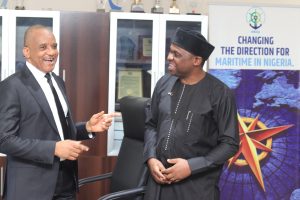
It has also been very enlightening and rewarding because I could use many of my skills, from public speaking to publishing to broadcast media, mixed with strategy and adapt those skills to the maritime environment while simultaneously learning about NIMASA and the industry universal.
It was a time experientially that was very educative and something I appreciate.
One prominent feature of that period was the NIMASA This Week TV programme you anchored. How did you raise that programme from what it was to a more engaging weekly production?
Interestingly, I never imagined that I would be anchoring “NIMASA This Week. “In many ways, it was a child of circumstance. By the time I arrived at NIMASA, on the 28th of August 2020, of course, NIMASA
This Week was being managed almost exclusively as a contract by a consultant that drove virtually the entire aspect of the production with the PR Unit providing editorial directives. I believe that NIMASA people should be the face of their Agency.
As time passed, we needed to tell our stories ourselves. That is the power of understanding how communication works, especially today. You shape your narrative and perceptions in the minds of people. I also saw what we were spending annually.
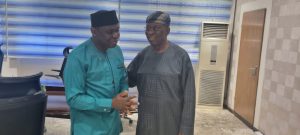
The first point was that we needed to tell our stories ourselves. Additionally, we saw that we were spending quite a lot on that single budget item.
As his Special Adviser on Communications and Strategy, the DG gave me directives and the support to achieve this twin objective. Reclaim editorial control and reduce the cost.
The man said the reason why he brought me in was to provide leadership for things like this. To bring my expertise as a communications professional and see how I could add value to the Agency.
I said that’s fine, and I began to do an internal audition of staff to see if I could get a few persons who could be the ones to anchor the programme.
From the initial audition we conducted, we, at the time, did not have the level of TV skills in-house amongst our public relations staff. It became clear that we were running out of time because the then-producer’s contract was ending in December, and we wanted to take complete in-house control of the programme.
It became obvious that we may not meet the deadline given. That was when I had to step up to the plate as producer and anchor. I already had television and broadcast experience. So, I sat down and re-imagined and redesigned the entire scope of the programme to NIMASA
This Week – The Voice of Maritime, given that NIMASA is the nation’s apex regulator and promoter of Maritime matters. We had to open up the programme regarding the architecture and the content by creating segments such as the Director-General’s Diary, which covered the weekly functions of the chief executive, Know Your Conventions to educate Nigerians more about the statutory global commitments NIMASA shares under the IMO,
Stakeholders of the Seas to feature key and leading players in the sector, Inside Shipping Segment to show millions of Nigerians what exactly happens in the belly of ships and maritime updates including directing traffic to our official website as well as engaging directly with the DG on all his social media handles weekly.
TV turned out to be an additional challenge to handle weekly alongside my statutory responsibilities to the DG as his SA daily on other matters of communications and contribution towards strategy. And you could also see the introduction of some NIMASA staff handling some of the segments of the programme, especially the consistent face and intelligence of Bisi George who anchored the Know Your Convention segment.
Closer to December 2020, we were anticipating a total takeover in January 2021; it became clear that I had to start anchoring the programme while, hopefully, we would have the time to prepare and train other staff at least to come on board. That was what led to my anchoring the first episode, the first by an in-house NIMASA staff.
During this period, we had written to Channels TV, and they also replied that under the new arrangement, there would not be any contractor to act as a go-between, and we would produce our content and send it directly to the 4 TV stations we were airing on at the time. NIMASA would pay Channels TV directly their money for airtime, which resulted in cost savings for the Agency.
This was just one task, deliverable under communications and public relations. This was a sub-item under the entire PR budgeting. We said we would pay Channels TV directly because there is an opportunity to save money and expand our viewership to other platforms.
At the same time, we would then set aside some money for technical aspects of the production of the TV programme with a consultant who handled shooting, producing documentaries, editing, and post-production for us because we didn’t have the in-house capability and then provided us with stand by equipment that we didn’t have for the period.
That was how we managed that transition, and by the second quarter of 2021, we could secure a contractor doing more for us at a reduced cost.
The money saved was what we started using to expand the viewership of the TV programme from the initial four stations to 7.
We were able to bring onboard TVC, Plus TV Africa, and Rave TV for the youthful audience, given NIMASA’s NSDP programme targeted at the demographic. From my strategic standpoint, reach was always crucial in making the NIMASA brand have a broad appeal to Nigerians. So we spent less and got increased value added.
As a registered advertising practitioner with APCON, we have a saying regarding spending on media buying and content exposure: we were now getting more bang for our buck.
That is really my account of my stewardship because government resources are a trust we hold for others. That was the intention and that was what we did by taking full responsibility for our stories to reach more platforms, and we did and then to save more money for the government.
That is the story of what led us to the kind of changes we made in terms of the editorial approach, manpower approach, and in terms of the external support approach in managing the entire “NIMASA This Week” TV programme. That gives us more control. My office was attached to the DG’s,so there was real-time knowledge of what was happening, and we could tell Nigerians exactly what NIMASA was doing weekly. We tell Nigerians that from the standpoint of insiders who knew the day-to-day happenings.
Using the programme, we reached out to stakeholders and external players to come in and feature by sharing their expertise and experiences and adding value. We also got invaluable feedback from stakeholders.
We were able to produce the programme without failure in terms of episodes. We were not repeating any episodes, and I anchored about 140 episodes of that programme.
In terms of engagement with stakeholders through the programme and other initiatives you ran. Without attempting to score yourself, how would you appraise stakeholders’ reaction to your service generally because we read in the media about commendations from the Maritime Workers Union of Nigeria and others. How would you appraise the engagement so far?
Sometimes it is difficult for me to make that assessment to begin with because I have it in mind that this is a sector that I was grafted into, so I never really had any sense of the history of the various stakeholders, their antecedent and their prior perception of the TV programme.
I never really did. I just came in. I saw that there was work to do and there was the opportunity to innovate and improve on the situation, and I just did that. I would not be the one to rate myself in terms of giving percentages, but I will tell you that I found the responses that came from a number of the stakeholders to be very encouraging.
Princess Vicky Hastrup was the first person I interviewed just to know her thoughts about how the maritime industry and NIMASA were doing. I remember she welcomed me with open arms and much encouragement. I also remember my interview with the late Barrister Margaret Orakwusi, where she talked brilliantly about fishing and maritime opportunities. One cannot forget my encounters with Captain Emmanuel Iheanacho, Comrade Adewale Adeyanju, PG of MWUN, Captain Tajudeen Alao, Captain Taiwo Akinpelumi, the late Otunba Kunle Folarin, and many more too numerous to mention all contributing brilliantly to the NIMASA This Week TV programme to truly make it the Voice of Maritime.
When we are talking about these stakeholders., these were some of the first set of individuals I had the privilege to interact with, and I said tell us your stories and thoughts. It was quite a broad spectrum of people, and if you ask me personally, there was a cheerful disposition toward what the programme was doing.
But I would leave the maritime industry to score myself. I would even request that you independently put a call through to them to provide the evaluation. Let them give the score as to what the programme meant to them and the industry during my time or under my watch because, as the anchor, I was also the program producer. That is more work for you to do as the media. You can assess, and then I will have my score from there.
But I will tell you, there was one day that I thought was for me the culmination and that was the day I said to myself that my work was done and the mission was accomplished. It was on the 2nd of May, 2023. I stepped out briefly from my office to update the DG on an important matter, only to bump into Chief Adebayo Sarumi, who had just finished a meeting with him.
Chief Adebayo Sarumi had led a group of individuals, Mission to Seafarers. As I walked into the office, Chief Sarumi was walking out through the door, and as we came face to face with each other, he looked at me and said, “You look even more handsome in real life than on TV.” We hugged and laughed boisterously as we exchanged pleasantries.
Then he stopped and said he wanted to thank me for what I had done with the TV programme. For someone who never had any prior knowledge or experience in maritime, he said I had done excellently well and began a comparative analysis between my work and its previous handlers. All this with the DG watching with a sense of pride and corroborating that was why he insisted that I serve as his SA when he took office in 2020.
He knew someone like me could make a difference, and he had to take the credit because it was his decision to hire me in the first instance. Chief Sarumi was very effusive in his commendation. That was, for me, a watershed moment and one of the most ultimate feedback I could have gotten directly because we all know who Chief Sarumi is in the maritime industry.
As you have exited NIMASA, how is life outside NIMASA now? What has changed? What are you doing now? What do you have your hands on? Have you retired finally?
Life is saner right now for me because the maritime sector is very active, and I would not use the word volatile. It is a very mercurial sector. There is never a dull moment; there are always activities. Interests never sleep, activities never end. There is always one thing or the other coming up. It is always a beehive of events.
One moment, it is a roller coaster of excitement. One moment, we are celebrating the reduction in piracy in our waters for one to one and a half years.
The next moment, you get something in the media that could be a direct attack on the Agency or Chief Executive for which one is responsible for watching over, and the next moment, you get call-ups to show up in Abuja and render account for activities and on and on it goes.
There were always activities, and it was very heart-thumping. Day in, day out, So engaging. That lifestyle was new to me. Life is now a lot saner. Today is Sunday, and there’s a heavy downpour; for instance, my wife was mocking me about 3 hours ago when I stopped by the school wing of my residence; as you know, I am back at the School of Eloquence as the Dean.
My wife was mockingly saying the DG was on the line and that I should answer the call. We laughed, and I told her that it was terrific. Life is so sane now because, as SADG under this heavy rain, there could have been a need to drive to Apapa amid this wet weather.
I am pleased to return to what I have always done best: speaking and teaching. I am also proud to have had the privilege to come into a sector, contribute, and become so well known in a fresh constituency and among people I have never known before, which is some credibility.
You never can tell where that leads to. I have built many relationships, and I look back with fondness despite many challenges, particularly appreciating Dr. Bashir Jamoh for the invitation to a nautical novice like myself to serve his apprenticeship in maritime, which is Nigeria’s next best hope of economic survival. But I am excited to be back at the School of Eloquence, doing what I love doing best.






